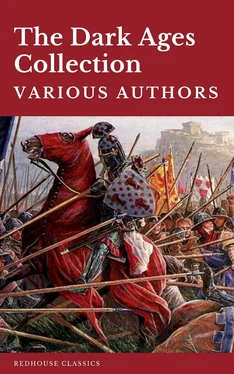While contemporary writers agree in painting John as a coarse monster, without a single redeeming quality, we must make some allowance for exaggeration. It is unlikely that he would have enjoyed so long the confidence of the Emperor if his sole recommendation had been skill in plundering the provinces. As a matter of fact, we shall see that during his second tenure of the Prefecture, which lasted about nine years, a series of provincial reforms was carried through which intimately concerned his own sphere of administration and in some respects diminished his power. This could not have been done without his co-operation, and we cannot fairly withhold from him part of whatever credit the legislation deserves. We may conjecture that he won and retained his influence over the Emperor, not only through his success in replenishing the treasury, but also partly through his independence, which was displayed when he openly opposed the project of conquering Africa, and partly through the fact that he was not hampered by conservative prejudices. It was chiefly his indifference to the traditions of the civil service that made him unpopular among the officials of the Prefecture.
Besides increasing the revenue by fair means and foul, John had recourse to economies which were stigmatised by contemporary opinion as injurious to the public interest. He cut off or reduced the service of the State post, with the exception of the main line to the Persian frontier. The post from Chalcedon to Dakibiza was abolished, and replaced by a service of boats to Helenopolis, while in southern Asia Minor and Syria asses were substituted for horses and the speed of travelling was diminished. The results were twofold. The news of disasters in the provinces, which demanded prompt action, was slow in reaching Constantinople. More serious was the consequence for the farmers in the inland provinces, who, deprived of the public means of transport, were obliged to provide for the transmission of their produce to the ports to be conveyed to the capital. Large quantities of corn rotted in the granaries; the husbandmen were impoverished; and the Prefect’s officials pressed for payment of the taxes in gold. 92Multitudes of destitute people left their homes and went to Constantinople. 93
Justinian was well satisfied with the fruits of John’s administration, and only too ready to shut his eyes to the methods by which the funds he needed were procured. How far he was really innocent it is impossible to determine, but we are assured that the ministers and courtiers always praised the Prefect to the Emperor, even though they had personal grievances against him. At length Theodora, who disliked the Cappadocian and was well acquainted with his iniquities, endeavoured to open Justinian’s eyes and to show him that, if the tyrannical administration were allowed to continue, his own position would be endangered. If her arguments produced any effect on his mind, he wavered and postponed action 94until action was suddenly forced on him by a revolutionary outbreak which well-nigh cost him his throne.
§ 5. The Nika Revolt (A.D. 532)
The famous rising at Constantinople, which occurred in the first month of A.D. 532 and wrecked the city, was the result of widely prevailing discontent with the administration, but it began with a riot of the Hippodrome factions which in ordinary circumstances would have been easily suppressed. 95We saw how Justinian in his uncle’s reign patronised the Blues and made use of them as a political support. But when he was safely seated on the throne, he resolved no longer to tolerate the licence of the factions, from the consequences of which he had formerly protected the Blues. Immediately after his accession he laid injunctions on the authorities in every city that the disorders and crimes of the factions should be punished impartially. 96
A number of persons belonging to both factions had been arrested for a riot in which there had been loss of life. Eudaemon, the Prefect of the City, held an inquiry, and finding seven of the prisoners guilty of murder, he condemned four to be beheaded, and three to be hanged. But in the case of two the hangman blundered and twice the bodies fell, still alive, to the ground. Then the monks of St. Conon, which was close to the place of execution, interfered, and taking up the two criminals, one of whom was a Blue, the other a Green, put them in a boat and rowed them across the Golden Horn to the asylum of the church of St. Laurentius. 97The Prefect, on hearing what had occurred, sent soldiers to guard the church. 98
The ides of January fell three days later (Tuesday), and, according to custom, horse races were held in the Hippodrome, and the Emperor was present. Both the Blues and the Greens importuned the Emperor with loud prayers to show mercy to the two culprits who had been rescued by accident from the gallows. No answer was accorded, and at the twenty-second race the spectators were amazed to hear the unexpected exclamation, “Long live the humane Greens and Blues!” The cry announced that the two parties would act in concert to force the government to grant a pardon, and it is probable that their leaders had previously arranged to co-operate. When the races were over, the factions agreed on a watchword, nika , “conquer,” and the rising which followed was known as the Nika Revolt. The united factions were known for the time as the Green-Blues ( Prasino-venetoi ).
In the evening the mob of rioters assembled at the Praetorium and demanded from the Prefect of the City what he intended to do with the refugees in St. Laurentius. No answer was given, and the rioters broke into the prison, released the criminals who were confined in it, killed some of the officials, and set fire to the building, which was partly burned. Elated by success they rushed eastward to the Augusteum and committed graver acts of incendiarism. They fired the Chalke, the entrance of the Great Palace, and not only was this consumed, but the flames spread northward to the Senate-house and the church of St. Sophia. These buildings were burned down. 99
On the following morning (Wednesday, January 14) the Emperor ordered the races to be renewed. But the Blues and Greens were not in the humour for witnessing races. They set on fire the buildings at the northern end of the Hippodrome, and the conflagration destroyed the neighbouring baths of Zeuxippus with the portico of the Augusteum. It is probable that on this occasion Justinian did not appear in the Kathisma, or face the multitudes who were now clamouring in the Hippodrome, no longer interceding for the lives of the two wretches who had escaped the hangman, but demanding that three unpopular ministers should be deprived of their offices. The demonstration was directed against Eudaemon, Prefect of the City, Tribonian the Quaestor, and John of Cappadocia, and the situation had become so serious that the Emperor decided to yield. 100Tryphon was appointed Prefect of the City, Basilides Quaestor, and Phocas, a man of the highest probity, was persuaded to undertake the office of Praetorian Prefect.
These concessions would probably have satisfied the factions and ended the trouble, like similar concessions in previous reigns, if the decision had depended solely on the leaders of the Blues and Greens. But the movement now wore an aspect totally different from that of the previous day. We saw how the city had been filled by throngs of miserable country folk from the provinces who had been ruined by the fiscal administration of the Praetorian Prefect and were naturally animated by bitter resentment against the Emperor and the government. It was inevitable that they should take part in the disturbances; 101it was at least a good opportunity to compass the fall of the detested Cappadocian; and the riot thus assured the character and proportions of a popular rising. But there were other forces in the background, forces which aimed not merely at a reform of the administration, but at a change in the dynasty. The policy of Justinian in seeking to make his power completely independent of the Senate and the Imperial Council had caused deep animosity in the senatorial class, and the disaffected senators seized the opportunity to direct the rising against the throne. 102We must attribute to the secret agitation of these men and their agents the fact that the removal of the obnoxious ministers, especially of John, failed to pacify the people.
Читать дальше












